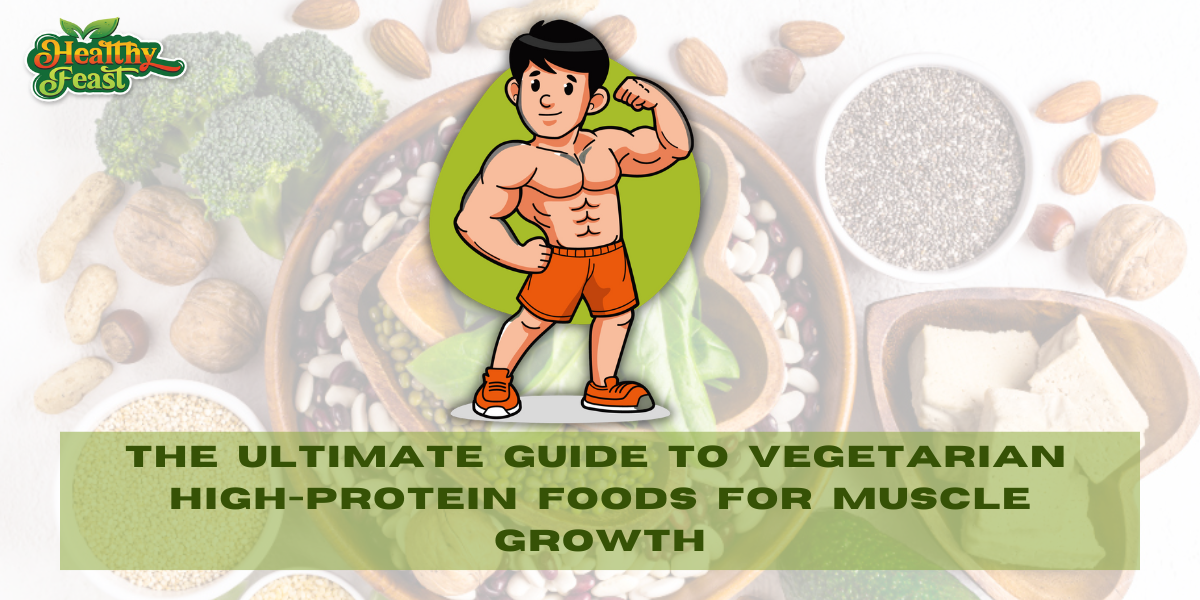Introduction
When it comes to building muscle, protein is crucial. But if you follow a vegetarian diet, you might wonder if you can get enough protein to support muscle growth. The good news is that there are plenty of plant-based foods that are rich in protein and can help you reach your muscle-building goals.
In this guide, we’ll explore the best vegetarian high-protein foods to fuel your workouts and help you build muscle. These foods are not only packed with protein but also full of other essential nutrients for overall health.
1. The Role of Protein in Muscle Growth
Protein plays a key role in muscle repair and growth. After a workout, your muscles need protein to repair the tiny tears that occur during exercise. This repair process makes your muscles grow more substantial.
For muscle growth, aim for about 1.2 to 2.0 grams of protein per kilogram of body weight, depending on your workout intensity. It’s essential to get a variety of protein sources to ensure you’re getting all the essential amino acids your body needs.
2. Top Vegetarian High-Protein Foods for Muscle Growth
a. Lentils
- Protein: 18g per cooked cup.
- Why they help: Lentils are high in protein and fiber, helping with muscle recovery and digestion.
- How to use: Add them to soups, stews, or make lentil-based salads.
b. Quinoa
- Protein: 8g per cooked cup.
- Why it helps: Quinoa is a complete protein, meaning it contains all nine essential amino acids.
- How to use: Use Quinoa as a base for bowls and salads, or substitute it for rice.
c. Chickpeas (Garbanzo Beans)
- Protein: 15g per cooked cup.
- Why they help: Chickpeas are packed with protein and fiber, making them great for energy and muscle repair.
- How to use: Make hummus, toss in salads, or roast for a crunchy snack.
d. Tofu
- Protein: 20g per 1/2 cup serving.
- Why it helps: Tofu is rich in iron and calcium, supporting muscle health and recovery.
- How to use: Stir-fry, scramble or bake Tofu for a protein-packed meal.
e. Tempeh
- Protein: 21g per 3-ounce serving.
- Why it helps: Tempeh is a high-protein, fermented food that aids digestion and muscle growth.
- How to use: Sauté, grill, or add Tempeh to stir-fries and sandwiches.
f. Edamame (Young Soybeans)
- Protein: 17g per cooked cup.
- Why they help: Edamame is rich in protein and fiber, perfect for muscle recovery.
- How to use: Snack on them steamed or tossed into salads and stir-fries.
g. Seitan
- Protein: 21g per 3-ounce serving.
- Why it helps: Seitan is one of the highest plant-based protein sources, and it is excellent for building muscle.
- How to use: Use Seitan in tacos, wraps, or stir-fries as a meat alternative.
h. Greek Yogurt (Plant-Based Options)
- Protein: 10g per 6-ounce serving.
- Why it helps: Plant-based Greek yogurt is packed with protein and probiotics, supporting digestion and muscle repair.
- How to use: Enjoy as a snack, add to smoothies, or top with fruit and seeds.
i. Hemp Seeds
- Protein: 10g per 3 tablespoons.
- Why they help: Hemp seeds are rich in protein, healthy fats, and magnesium, which help with muscle function.
- How to use: Sprinkle on salads, yogurt, or blend into smoothies.
j. Peanut Butter (Natural)
- Protein: 8g per 2 tablespoons.
- Why it helps: Peanut butter provides protein and healthy fats for sustained energy.
- How to use: Spread on toast, add to smoothies, or enjoy with fruit.
3. Meal Planning for Muscle Growth: Protein-Rich Vegetarian Meals
To build muscle, it’s important to include protein in every meal. Here are some simple meal ideas:
- Breakfast: Tofu scramble with Quinoa and veggies.
- Lunch: Chickpea and quinoa salad with avocado and greens.
- Dinner: Tempeh stir-fry with edamame and brown rice.
- Snacks: Greek yogurt with hemp seeds or peanut butter with apple slices.
4. Nutrients to Support Muscle Growth Alongside Protein
Protein is essential, but other nutrients are also crucial for muscle growth:
- Carbs: Provide the energy needed for intense workouts.
- Healthy Fats: Help with hormone production, which supports muscle growth.
- Vitamins and Minerals: Iron, calcium, and magnesium are crucial for muscle function and recovery.
5. Tips for Maximizing Muscle Growth on a Vegetarian Diet
- Meal timing: Try to eat protein at each meal and include a protein source after workouts for recovery.
- Protein supplements: If needed, consider plant-based protein powders like pea protein or hemp protein to meet your daily needs.
Consistency: Stick to your diet and workout routine for the best muscle growth results.
Conclusion
Vegetarian diets can provide plenty of high-quality protein to support muscle growth. By adding these top protein-rich foods to your meals, you can fuel your body, build muscle, and recover effectively. Start incorporating these foods today, and watch your muscle growth soar!

